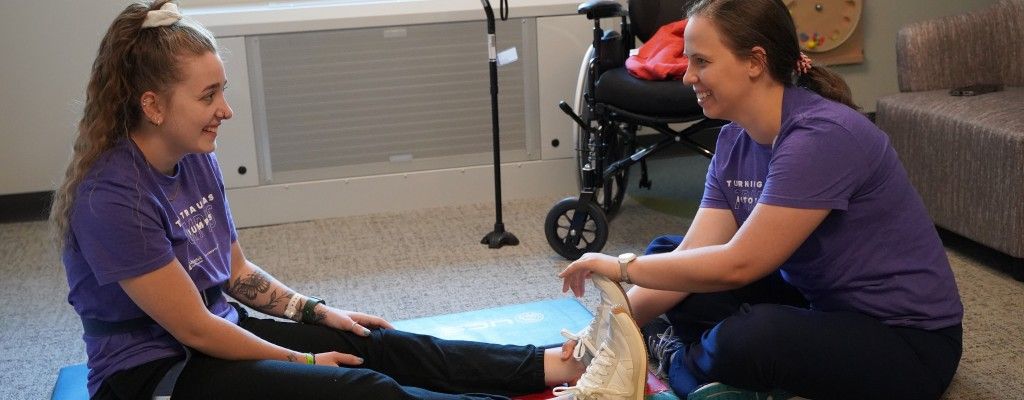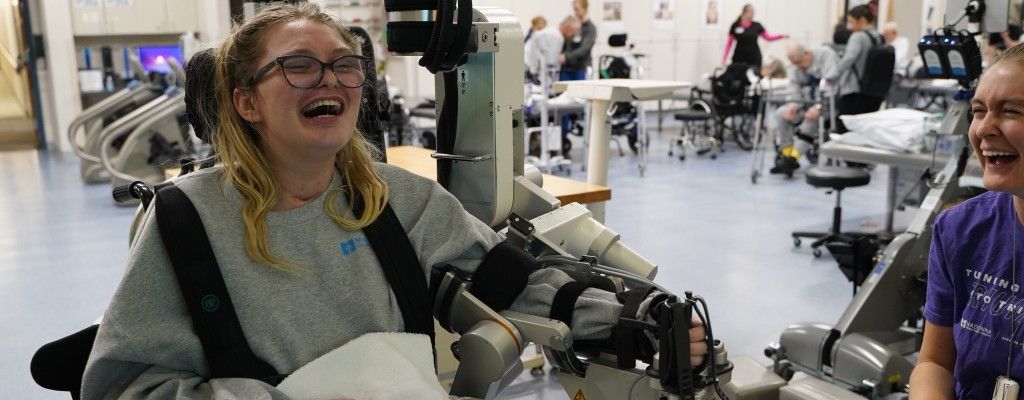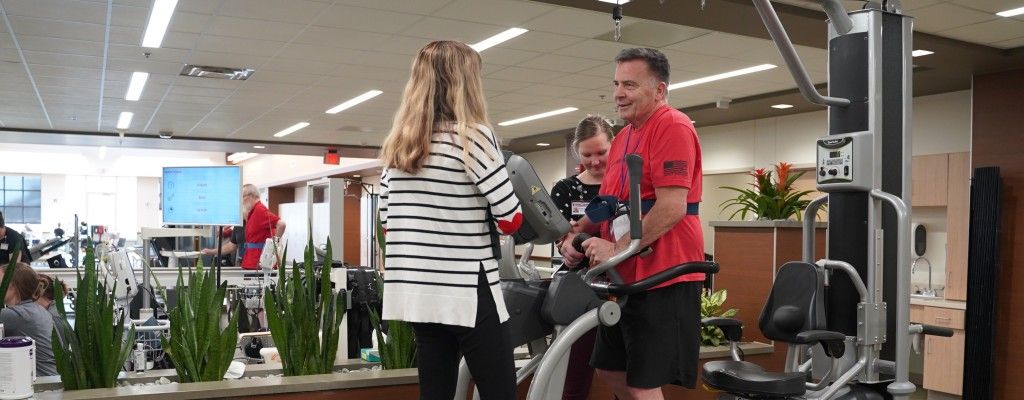STROKESTROKE
We offer stroke survivors of all ages a comprehensive continuum of care, with multiple levels of inpatient care, a robust outpatient Rehabilitation Day program, and a traditional outpatient therapy program.

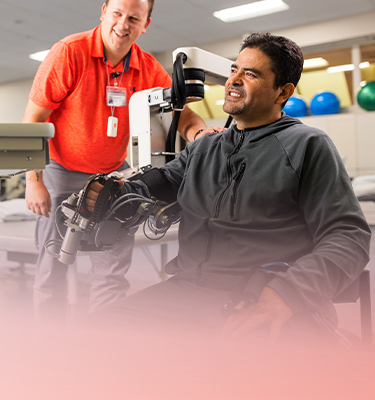
0
0
0
0
Stroke Program Overview
Our CARF-accredited stroke rehabilitation program serves adults and children with mild to severe stroke. We believe in truly patient-centered care, focusing on family involvement, innovative technology, personalized treatment plans, and unmatched hospitality. Madonna has helped thousands of stroke survivors regain their maximum level of independence.
Key Program Features
Madonna’s combination of holistic, expert care and specialized technology in the hands of our clinical team leads to better patient outcomes. Madonna also offers simulated environments within the hospital, which allow qualified patients to safely practice daily living skills and return to work and home faster.
Family Involvement
Involving family in rehabilitation is a proven motivator during recovery. It also helps our Madonna care team understand an individual’s crucial goals for reintegration into the community.
Specialized Technology
Madonna continually develops and acquires new technologies to enhance patient care. Combining technical expertise with the experience of our clinical teams is critical to patients returning to work, school and their communities.
A Typical Day
We recognize that each patient is different. That’s why Madonna’s rehabilitation approach is tailored to an individual’s needs and goals.
PATIENT STORIES

An Interdisciplinary team will guide the recovery process
Madonna’s care team of highly trained experts across specialties offers the best experiences and outcomes for stroke survivors and their families. This physician-led team includes skilled physical therapists, occupational therapists, speech-language pathologists, respiratory therapists, rehabilitation nurses, neuropsychologists, certified teachers and more.
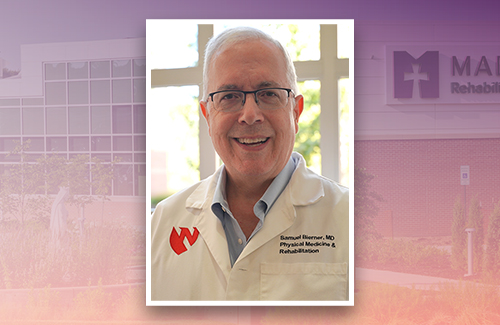
Overseen by a Board-Certified Physician in Physical Medicine and Rehabilitation
Dr. Samuel Bierner, MD, a physiatrist partner, oversees the patient care in our stroke program. Bierner completed his residency in physical medicine and rehabilitation at the University of Washington (Seattle) and pursued a fellowship in clinical neurology at the Human Motor Control Branch, National Institute of Neurological Disorders and Stroke. He holds board certification in pain medicine and neuromuscular medicine in addition to physical medicine and rehabilitation. He also teaches at the University of Nebraska Medical Center, one of Madonna’s acute care partners.
Awards & accreditations
We gain recognition by acknowledging each patient’s unique needs. We are always pioneering and researching new technologies to serve specialized purposes, investing in exceptional medical talent, and developing progressive treatments to change the face of rehabilitation. Everything we do is dedicated to helping you live your most independent life.
CARF Accreditation
Madonna has received the highest possible level of accreditation from the Commission on Accreditation of Rehabilitation Facilities (CARF) across 14 inpatient/outpatient categories. This year, Madonna celebrates 45 years of continuous CARF accreditation.
Stroke Specialty Program CARF Accreditation
Madonna has received the highest possible level of accreditation from the Commission on Accreditation of Rehabilitation Facilities (CARF) for its stroke inpatient and outpatient specialty programs for adults on both campuses.
American Heart Association’s Mission: Lifeline Stroke Certification of Achievement
Madonna received this recognition in 2024 for our commitment to providing quality stroke rehabilitation. According to the American Heart Association, Certificate of Achievement recipients have committed to their rigorous science-based requirements for stroke rehabilitation, including program management, patient and caregiver education and support, care coordination, clinical management and quality improvement.
Additional Information
Glossary of Terms
Learn the most commonly used terms in stroke rehabilitation here.
Patient Financial Services
From understanding billing and insurance to exploring payment options and financial assistance, we ensure you have the necessary resources and guidance.
Family Housing
We provide comfortable and convenient housing options so you can stay connected and supportive throughout your loved one’s recovery journey. Explore our amenities today.
Support Groups
You don’t have to go through the rehabilitation journey alone. We offer a variety of support groups, with virtual and in-person options available.
- Lincoln Campus
- Fourth Thursday of the month 1-2 p.m.
- Lincoln-Donlan Conference Room
- Contact Carol Olson at colson@madonna.org for any questions.
- Omaha Campus
- Nebraska’s Hope for a Better Tomorrow Stroke Support Group
- Second Tuesday of the month from 6-7 p.m.
- Omaha- Dodge Conference Room
- Contact Kassi Pichler at kpichler@madonna.org for more information.
Resources
The amount of information available about stroke can be overwhelming. Madonna coordinates with local, regional and national organizations to help patients find the most helpful online resources.
View stroke resources here.
Scope of Services
Madonna Rehabilitation Hospital offers comprehensive programming for individuals ages 0-100 with all types of strokes, from those still in the early stages of recovery following a very severe stroke to those who have had a mild stroke that doesn’t require inpatient care. Our program is accredited by the Commission on Accreditation of Rehabilitation Facilities (CARF), as an inpatient and outpatient Stroke Specialty Program, hospital level, for adults and pediatric family-centered care.
Madonna’s Stroke Program served nearly 900 patients with stroke across inpatient and outpatient levels of care at both campuses in FY 2023. Approximately 29% of patients’ permanent residences were outside the Lincoln and Omaha metro. Madonna’s multiple levels of inpatient care, as well as outpatient services, at both of our campus locations, ensures we can offer each stroke patient the right type of care at the right time.
Madonna’s goal is to help the people we serve become as independent as possible while establishing a partnership for life that the patient and family can turn to when needed. Programming is highly individualized and dependent upon each person’s needs. Family members are encouraged to be actively involved in the patient’s care and to attend therapy sessions whenever possible so they may reinforce new techniques being taught. Research shows a correlation between family involvement and the rate at which patients return home. Madonna’s stroke program provides interventions in the following areas:
- Assessment and Treatment: Patients and families are taught prevention, how to recognize the signs/symptoms of stroke, and receive treatment for conditions related to stroke and its complications.
- Addressing Risk Factors: The risk for recurrent stroke is assessed and addressed. Patients and their families are taught about these risk factors.
- Functional independence: The overall goal of the program is to gain functional independence. This is accomplished with skilled rehabilitation interventions, training, and use of adaptive equipment and/or techniques.
- Coping Skills: Rehabilitation psychologists, other clinicians and peer volunteers assist patients and their family members/support system with learning techniques for coping and adapting to life after stroke.
- Community Integration: The ability to resume one’s life role and reintegrate back into the community is another goal of the Stroke Program at Madonna. Community integration skills are taught as part of therapy and activities relating to a patient’s life roles simulated and practiced during the rehabilitation process.
- Services for Families: Stroke affects the whole family and involvement of spouses, children, and others in the patient’s support system is a vital part of recovery. Madonna’s Stroke Program encourages family members and caregivers to be involved in education, training, peer support, support groups and counseling.
Clinical Expertise: Each patient’s care is directed by a physician who specializes in physical medicine and rehabilitation and/or a physician with specialization in internal medicine. For individuals who are 18 years or younger, a pediatrician is involved in their care on a daily basis. All Madonna nurses are specially trained in providing care for patients with stroke, and several Madonna nurses have specialty training as Certified Rehabilitation Registered Nurses (CRRN).
Rehabilitation: Madonna has a dedicated team of professionals who have completed special competency training in the treatment of persons with stroke. Each individual’s treatment team is made up of physical, occupational, speech, recreational and respiratory therapists, social workers, rehabilitation nurses, and case managers, as well as staff from neuropsychology as appropriate. They work together with the patient and their family/caregiver to meet the unique physical, cognitive, social and emotional needs of the patient.
Days and Hours of Service: Therapy services are provided Monday through Friday, 7 a.m. to 5 p.m. Patients receive on average, three hours of therapy per day, five days per week in acute rehabilitation and are seen on average, 2-3 times per week on an outpatient basis as appropriate. Saturday and Sunday therapies are provided on an as-needed basis for inpatients.
Fees: Cost of care is determined by diagnosis, level of care, medical acuity and length of stay. Madonna accepts patients with a variety of funding, including Medicare, Nebraska Medicaid, commercial insurances such as Blue Cross Blue Shield, and worker’s compensation, and will consider out-of-state Medicaid and non-funded patients on a case-by-case basis. For more information, click here.
Environment: Madonna’s environment affords individuals with stroke many opportunities to interact and support one another, whether it is in the spacious gym area during therapy, sharing a meal in the congregate dining area, or participating in a leisure activity outside in one of many garden areas. Madonna is the only facility in the region to have a simulated community, called Independence Square, where patients may engage in real-life skills training, such as grocery shopping, cooking a meal, transferring in and out of a car or getting in and out of bed.
Community Re-entry: Rehabilitation does not end when the patient gains basic skills of self-care and mobility. Participation in a variety of community re-entry and adaptive sports and recreational outings can be integrated into therapy or just for fun. Patients may also work on specific goals related to return to driving, school re-entry, or visit with a vocational rehabilitation counselor about work re-entry.
Preparation for Home: Madonna’s stroke patients and their caregivers are provided with a self-care training program based upon principles of self-advocacy and self-direction. Patients, with or without their caregivers, are taught how to direct their care and what to do if emergencies arise. They are provided with opportunities to practice these skills during their stay, frequently ending with a stay in Madonna’s transitional living apartment. This apartment is located on the unit, with easy access to medical staff if needed, with the expectation that a family member or other caregiver will assist with the personal care required during their stay. The patient will direct his/her care and independently follow his/her therapy schedule. In addition, a 2-week daily stroke education class is provided for all patients and family members/caregivers on a variety of stroke-related topics.
Home Assessment: Another way to prepare the patient for a successful transition to home is by offering the opportunity for patients to return home for the day to practice skills in their home setting while evaluating the home for accessibility and any adaptations or modifications that may be required. For patients and families who live outside Lincoln and Omaha and the surrounding communities, a paper/pencil home assessment form is provided for the family member or caregiver to complete.
Long-term Follow-Up: Madonna offers many ways to help individuals with stroke and their family members continue to improve and maintain their functional gains, therefore maximizing their participation throughout the rest of their lives.
- It is important that individuals completing rehabilitation stay active and exercise safely. We promote success by teaching how and what to do in a community-based fitness environment, featuring trained staff and specially adapted equipment.
- After you experience a stroke you may be confronted with a wide range of challenges throughout your lifetime. Because these challenges and limitations may not be evident until later, focusing on maintaining health long-term, including preventing secondary complications, is an important part of lifelong care planning.
- A representative from Madonna will contact you 6-12 months after discharge to see how you are doing and to gather outcome information.
Virtual Services: Madonna stroke support groups and outpatient physical, occupational and speech therapy services are available virtually for patients and families who may have transportation, geographical or other barriers to accessing these services in person. Madonna offers telehealth services for psychiatric consults at the Omaha campus and infectious disease consults at the Lincoln campus for patients in inpatient rehabilitation. Virtual home assessments are provided for persons and families served on inpatient regardless of geographic location to provide the most appropriate recommendations on home accessibility and modifications to ensure a safe transition to home and community. Virtual services can potentially be provided in any geographic region of the United States. Madonna is limited by professional licensing requirements by state and currently has a mix of therapists and physicians licensed to provide virtual services in the states of Nebraska, Iowa, Missouri and Kansas.





